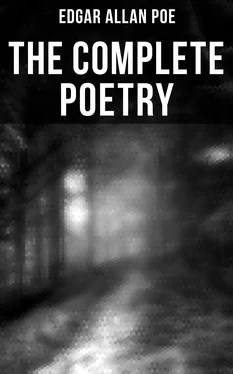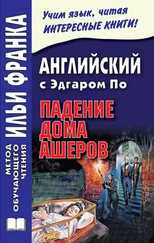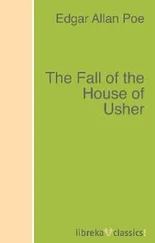"In Youth I have known one"
Table of Contents
How often we forget all time, when lone
Admiring Nature's universal throne;
Her woods—her wilds—her mountains—the intense
Reply of Hers to Our intelligence!
I
In youth I have known one with whom the Earth
In secret communing held—as he with it,
In daylight, and in beauty, from his birth:
Whose fervid, flickering torch of life was lit
From the sun and stars, whence he had drawn forth
A passionate light such for his spirit was fit—
And yet that spirit knew—not in the hour
Of its own fervor—what had o'er it power.
II
Perhaps it may be that my mind is wrought
To a ferver by the moonbeam that hangs o'er,
But I will half believe that wild light fraught
With more of sovereignty than ancient lore
Hath ever told—or is it of a thought
The unembodied essence, and no more
That with a quickening spell doth o'er us pass
As dew of the night-time, o'er the summer grass?
III
Doth o'er us pass, when, as th' expanding eye
To the loved object—so the tear to the lid
Will start, which lately slept in apathy?
And yet it need not be—(that object) hid
From us in life—but common—which doth lie
Each hour before us—but then only bid
With a strange sound, as of a harp-string broken
T' awake us—'Tis a symbol and a token—
IV
Of what in other worlds shall be—and given
In beauty by our God, to those alone
Who otherwise would fall from life and Heaven
Drawn by their heart's passion, and that tone,
That high tone of the spirit which hath striven
Though not with Faith—with godliness—whose throne
With desperate energy 't hath beaten down;
Wearing its own deep feeling as a crown.
Table of Contents
I
How shall the burial rite be read?
The solemn song be sung?
The requiem for the loveliest dead,
That ever died so young?
II
Her friends are gazing on her,
And on her gaudy bier,
And weep!—oh! to dishonor
Dead beauty with a tear!
III
They loved her for her wealth—
And they hated her for her pride—
But she grew in feeble health,
And they love her—that she died.
IV
They tell me (while they speak
Of her "costly broider'd pall")
That my voice is growing weak—
That I should not sing at all—
V
Or that my tone should be
Tun'd to such solemn song
So mournfully—so mournfully,
That the dead may feel no wrong.
VI
But she is gone above,
With young Hope at her side,
And I am drunk with love
Of the dead, who is my bride.—
VII
Of the dead—dead who lies
All perfum'd there,
With the death upon her eyes.
And the life upon her hair.
VIII
Thus on the coffin loud and long
I strike—the murmur sent
Through the gray chambers to my song,
Shall be the accompaniment.
IX
Thou diedst in thy life's June—
But thou didst not die too fair:
Thou didst not die too soon,
Nor with too calm an air.
X
From more than friends on earth,
Thy life and love are riven,
To join the untainted mirth
Of more than thrones in heaven.—
XI
Therefore, to thee this night
I will no requiem raise,
But waft thee on thy flight,
With a Pæan of old days.
Table of Contents
On the "Poems written in Youth" little comment is needed. This section includes the pieces printed for the first volume of 1827 (which was subsequently suppressed), such poems from the first and second published volumes of 1829 and 1831 as have not already been given in their revised versions, and a few others collected from various sources.
"Al Aaraaf" first appeared, with the sonnet "To Silence" prefixed to it, in 1829, and is, substantially, as originally issued. In the edition for 1831, however, this poem, its author's longest, was introduced by the following twenty-nine lines, which have been omitted in all subsequent collections:
Mysterious star!
Thou wert my dream
All a long summer night—
Be now my theme!
By this clear stream,
Of thee will I write;
Meantime from afar
Bathe me in light!
Thy world has not the dross of ours,
Yet all the beauty—all the flowers
That list our love or deck our bowers
In dreamy gardens, where do lie
Dreamy maidens all the day;
While the silver winds of Circassy
On violet couches faint away.
Little—oh! little dwells in thee
Like unto what on earth we see:
Beauty's eye is here the bluest
In the falsest and untruest—
On the sweetest air doth float
The most sad and solemn note—
If with thee be broken hearts,
Joy so peacefully departs,
That its echo still doth dwell,
Like the murmur in the shell.
Thou! thy truest type of grief
Is the gently falling leaf—
Thou! thy framing is so holy
Sorrow is not melancholy.
The earliest version of "Tamerlane" was included in the suppressed volume of 1827, but differs very considerably from the poem as now published. The present draft, besides innumerable verbal alterations and improvements upon the original, is more carefully punctuated, and, the lines being indented, presents a more pleasing appearance, to the eye at least.
Note on To Helen, The Valley of Unrest, Israfel etc.
"To Helen" first appeared in the 1831 volume, as did also "The Valley of Unrest" (as "The Valley Nis"), "Israfel," and one or two others of the youthful pieces.
The poem styled "Romance" constituted the Preface of the 1829 volume, but with the addition of the following lines:
Succeeding years, too wild for song,
Then rolled like tropic storms along,
Where, though the garish lights that fly
Dying along the troubled sky,
Lay bare, through vistas thunder-riven,
The blackness of the general Heaven,
That very blackness yet doth fling
Light on the lightning's silver wing.
For being an idle boy lang syne,
Who read Anacreon and drank wine,
I early found Anacreon rhymes
Were almost passionate sometimes—
And by strange alchemy of brain
His pleasures always turned to pain—
His naïveté to wild desire—
His wit to love—his wine to fire—
And so, being young and dipt in folly,
I fell in love with melancholy.
And used to throw my earthly rest
And quiet all away in jest—
I could not love except where Death
Was mingling his with Beauty's breath—
Or Hymen, Time, and Destiny,
Were stalking between her and me.
...
But now my soul hath too much room— Gone are the glory and the gloom— The black hath mellow'd into gray, And all the fires are fading away. My draught of passion hath been deep— I revell'd, and I now would sleep— And after drunkenness of soul Succeeds the glories of the bowl— An idle longing night and day To dream my very life away. But dreams—of those who dream as I, Aspiringly, are damned, and die: Yet should I swear I mean alone, By notes so very shrilly blown, To break upon Time's monotone, While yet my vapid joy and grief Are tintless of the yellow leaf— Why not an imp the greybeard hath, Will shake his shadow in my path— And e'en the greybeard will o'erlook Connivingly my dreaming-book.
Читать дальше












